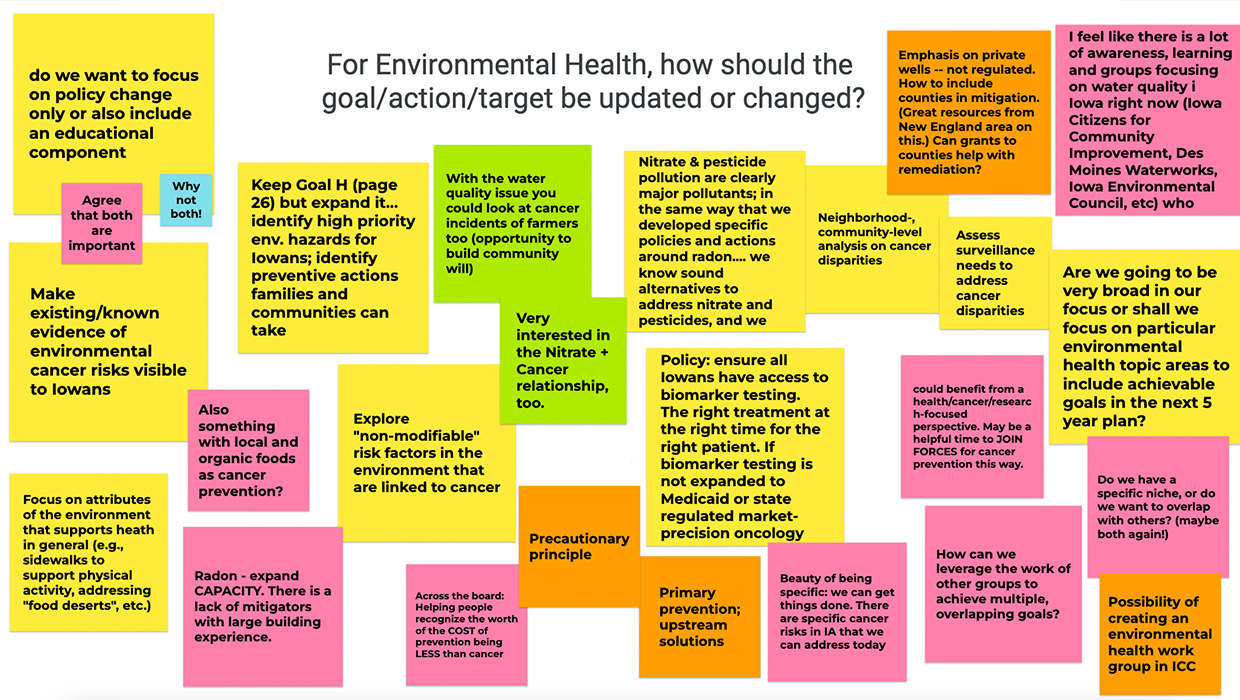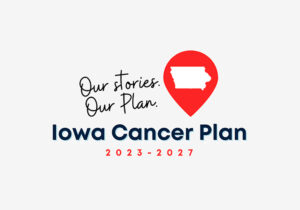Reducing Environmental and Occupational Cancer Risks Toolkit
Module 6: 3 States Implementing Cancer Risk Reduction Strategies
1. Iowa: Building, Empowering, and Leveraging a Cancer Coalition
Before establishing environmental cancer risk reduction as a key priority in their 2023-2027 state cancer plan, the Iowa Cancer Consortium focused almost exclusively on radon, a common priority among the majority of states that currently have an environmental cancer reduction goal.

Iowa’s environmental cancer risk reduction arc and its inclusion in the state’s cancer plan was accelerated by the Iowa Cancer Consortium, convening many groups that had already been working on the issue of environmental cancer risk. The Consortium facilitated a series of meetings in which a range of carcinogens, from arsenic to pesticides to nitrates were
identified that were of concern to both the health of workers and the broader public. Intervention strategies identified in the Iowa Cancer Plan are intended to leverage the expertise of Consortium members and the need to more fully analyze state-wide environmental health tracking data to better target cancer reduction opportunities and
communicate exposure risk to the public.
Now that the Iowa Cancer Consortium team knew that environmental cancers were to be more broadly addressed in the state’s cancer plan, the next question to figure out was, who will help drive this momentum forward?
When discussing the implementation of specific features of an expanded priority on reducing exposure to environmental carcinogens (which is inclusive of occupational as well) (see box above), Consortium leadership understood the importance of “bringing the right people to the table”. This took the form of engaging agricultural experts to emphasize occupational hazards that Iowans are exposed to; Iowa Cancer Consortium Radon Workgroup members to leverage existing environmental scientific expertise; community members to obtain accurate on-the-ground manifestations of environmental injustices; and engaging state public health offices, survivors, environmental health experts from within and beyond the Consortium. The Consortium’s previous involvement with radon also led to the creation of a Cancer and the Environment Task Force dedicated to this expanded topic area.

Incorporating new and complex cancer risk reduction strategies may seem like an overwhelming undertaking, but the Iowa Cancer Consortium leaders affirmed the importance of empowering and creating shared leadership among these new Consortium members, which helped the plan become more expansive (Habit # 1 for a Successful Cancer Coalition). An additional asset: a dedicated environmental health champion within the Consortium. Much of what the Consortium was able to achieve in developing a new priority focused on environmental cancer risk reduction was due to the tireless efforts of a single champion who is also an environmental health expert and helped to bring greater substance and motivation to identifying what is needed and feasible. The individual ensured that Iowa’s specific environmental and occupational cancer risks, concerns about health equity, and the state of the science were critical discussion points throughout the creation process. Not only did the champion gather information that might not otherwise have made it to the final draft of the plan, but they helped to bolster partnerships and attention to occupational concerns. Having a content expert as a dedicated strategic partner and willing leader created the space to grow new untapped capacities for the state’s cancer plan.
 The Iowa Cancer Consortium emphasizes the need to “honor the beginning of the process” and that changes to the Plan are expected at this formative stage. As such, this new priority of environmental cancer risk reduction benefits from an online format for the Iowa Cancer Plan, affording the ability to edit and evolve strategies and actions as new science and insights become available. The Iowa Cancer Consortium will continue to use resources, internal capacity, dedicated champions, and new strategic partners to continually refine and update the Plan.
The Iowa Cancer Consortium emphasizes the need to “honor the beginning of the process” and that changes to the Plan are expected at this formative stage. As such, this new priority of environmental cancer risk reduction benefits from an online format for the Iowa Cancer Plan, affording the ability to edit and evolve strategies and actions as new science and insights become available. The Iowa Cancer Consortium will continue to use resources, internal capacity, dedicated champions, and new strategic partners to continually refine and update the Plan.
Note: The Iowa Cancer Consortium is a non-partisan, non-political organization and does not use state or federal funds to engage in lobbying. Views presented by participants during workgroup meetings and in communications, including advocacy opportunities, do not necessarily represent the opinions or positions of the Iowa Cancer Consortium, its board of directors, staff, or membership.